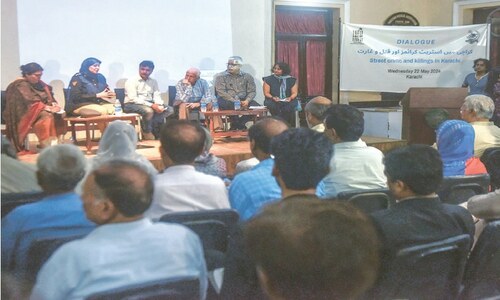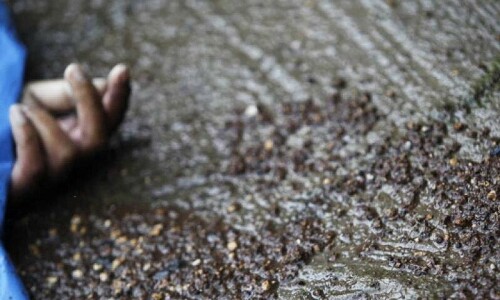KARACHI: A big number of lovers of cinema and literature gathered on Friday evening at the Arts Council of Pakistan at an event held to pay tribute to the distinguished Indian playwright and screenwriter Javed Siddiqui, who has iconic films such as Shatranj Ke Khiladi, Umrao Jan, Baazigar and Dil Waale Dulhanya Le Jayenge to his credit. He is also the author of Langarkhana (pen sketches) and Tumhari Amrita, an adaptation of A R Gurney’s popular play Love Letters.
The programme began with the cutting of cake because it was also Mr Siddiqui’s birthday. The council’s president Ahmed Shah welcoming the guests said he’d been in touch with the author over the phone but now since he’s here to attend a wedding of a member of his family in Karachi it’s an opportunity to meet him.
Then Zia Mohyeddin read a sketch written by Siddiqui titled Bi Huzoor prior to which he told the audience that he’d known the author through his two plays Begum Jaan and Salgirah, which were performed at the National Academy of Performing Arts (Napa).
The reading was followed by a show-reel of some of the movies that Mr Siddiqui has penned dialogue for. When a clip from Dil Waale Dulhanya Le Jayenge aka DDLJ was shown, a certain section of the crowd clapped in excitement.
The chitchat with the writer was moderated by Dr Fatema Hassan and Zehra Nigah.
Replying to a question, Mr Siddiqui said he’s lucky that he was born in an educated family which comprised many luminaries such as Maulana Mohammad Ali, Maulana Shaukat Ali, Hafiz Ahmed Ali Shauq (his great grandfather) and painter Shakir Ali (his uncle).
Ms Nigah initiating the conversation said she first read Mr Siddiqui’s book of sketches in London, and had always wanted to meet him. She wondered why, despite writing notable works of art, whenever she talks about Mr Siddiqui with anyone, they immediately mention DDLJ arguing that the film is timeless (purani hoti he nahin hai). “I tell them he’s done many things that are timeless.”
To this, the author responded, “It pains me to see that DDLJ is becoming my identity. It is not my identity. I admit that it’s one of my good works of writing, but I wanted my identity to be made somewhere else.”
Ms Nigah added she’s seen the film Shatranj Ke Khiladi directed by Satyajit Ray twice or three times, and asked the writer how difficult it was for him to pen the dialogue for it. Mr Siddiqui answered, “I had no intention of writing for films. I hadn’t even thought about it. Now that I look back on my life I realise that probably life doesn’t move the way we want it to move. It’s someone else’s intentions that keep you going.”
Expanding on it, the author said, “I became a journalist at the age of 17. Worked for quite a few publications, Urdu and English, took out my own newspaper, and did that for 16 years. Then the circumstances in India changed, a state of emergency was declared, and it became difficult to do truthful journalism. At that juncture, I received a proposal that the great director Satyajit Ray, who had only made films in the Bengali language, wants to make his first Urdu film based on Munshi Premchand’s story Shatrjan Ki Bazi and is looking for a writer who’s not filmi but knows the language well. Shama Zaidi, my best friend, was doing the costumes for the film. She suggested my name to Ray. I went to meet the director and our meeting lasted hardly for three or three and a half minutes. When I said to him that I could translate some of my works for him to gauge how capable a writer I was, he remarked, ‘No young man, I can look at you and that’s enough.’”
Mr Siddiqui’s wife Farida also spoke on the occasion. She said her husband is an intelligent and hard-working man.
After the discussion a short film made on the life of the author was screened.
Published in Dawn, January 15th, 2023















































Dear visitor, the comments section is undergoing an overhaul and will return soon.